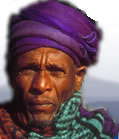THEMES IN THIS
TESTIMONY
Communications

Environment

Gender

Health

History

Identity

Land

Livestock

Population

Traditional Skills

Click on arrows
to find more
testimonies
featuring
these themes
|
|
Sex
|
female
|
|
|
Age
|
45
|
|
|
Occupation
|
farmer/ female head of household
|
|
|
Location
|
Meqerqeriat (lowlands)
|
|
|
Date
|
May 1997
|
|
summary
The narrator describes the hardship that she and her community face as a result of the land’s declining productivity. Nevertheless, she is hopeful that new development activities, including measures to control soil erosion, will improve their lives. She expresses her happiness at some of the social changes that have taken place, such as friendlier relations between highlanders and lowlanders, and the improved status and greater freedom that education has given to women. Although childless herself, she says she is happy that “life [is] better for mothers and children”. During the course of the interview she sings several traditional songs.
detailed breakdown
|
You will need a password from Panos to view the full
transcript of the interview. To apply for a password, click here.
Once you have a password, click here to go to the beginning
of the transcript. You can also click on any section of the
breakdown of content below and go straight to the
corresponding part of the transcript.
|
| Section 1 |
Deforestation, degradation of the land and dwindling livestock numbers. Population growth: “Livestock production has been replaced by the production of children.”
|
| Section 2 |
Land redistribution, smaller plots and unsustainable cultivation as the cause of hardship: “From June to September it is a period of misery and death.”
Increase in the cost of goods and not being able to afford essential items for her family: “I think all this hardship is frustrating me and making me ill.” Hopes of improvement, even “transformation”, with the new development activities – clinic, water pump, school, tree-planting. Song about the beauty of the place.
|
| Section 3 |
Description of Mahber (community association for those who share the same patron saint) – few households now able to afford the traditional feast. Song about infertility.
|
| Section 4 |
Marriage – no dowry in the old days; now the suitor asks if the woman has property before proposing. Family history – mother and grandmother taken captive during the Italian invasion (then released). Improved relationship between highlanders and lowlanders. Oppression of women in the past but greater equality and freedom now, owing to education.
Causes of conflicts – diverting streams for irrigation, boundary disputes.
|
| Section 5-6 |
Meket people’s identity shaped by their Christian beliefs and customs. Changes brought by the new road – good for business and trade but people exposed to more disease, especially AIDS. Coping with the 1985 drought.
Funeral customs – deceased used to be praised as heroes: “Nowadays, everyone is equal, so there is no such ceremony.”
|
|


